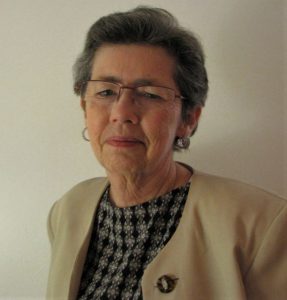Jan Lee

I can still remember my first civics lesson by my grandmother, a Ukrainian Jew who fled the pogroms of the 1900s and later immigrated to the United States. I was 5 years old, and I had to stand on my toes and crane my neck back to see the map she had affixed on the wall. She waved her hand across a map that was adorned with illustrations of children in their traditional costumes and began to teach me about the importance of the Universal Declaration of Human Rights. Both the Declaration and the Genocide Convention were adopted by the United Nations in 1948 in response to the Shoah, with the lofty ideal of ensuring that the world would “never again” witness another ethnic holocaust.
Looking back, it seems like a strange way to teach a kindergartner about the importance of multiculturalism, which was my grandmother’s goal. But for Rivka Panich Lee, who had lost most of her relatives to pogroms and the Nazis, the path to peace started with teaching her grandchildren about the potential for global unity.
It would take almost another half-century before the United Nations would officially adopt Jan. 27 as International Holocaust Remembrance Day and a yearly reminder of the need to protect human rights across the globe. By then, my grandmother had long passed. But if she were still alive, she would have insisted on continuing that civics lesson. Collective memory she would tell me, speaks volumes, but only when we acknowledge it and only when we speak in unison.
Unfortunately, that collective voice has become more sporadic over the years. The pandemic and the cautious deterrent to large gatherings has naturally played a role in reducing turnout for the Jan. 27 memorial. It has made it harder to ensure a full turnout for in-person gatherings.
Most Holocaust commemorations in America are held in April, when the United States Holocaust Memorial Museum (USHMM) hosts its annual Days of Remembrance. Few, in comparison, hold biannual events that acknowledge the importance of these two U.N. doctrines. So I know what my grandmother (and probably many of her generation) would be asking when communities across the globe are again facing a rise in antisemitism and anti-ethnic rhetoric: Can there really be too many conversations about the Shoah?
The truth is, the world has always had an uncomfortable relationship with the concept of a convention that legally obligates countries to prevent genocide, and America is no exception. It wasn’t until 1988 that Congress actually ratified the Genocide Convention. According to USHMM’s archives, it took Sen. William Proxmire of Wisconsin 19 years and 3,000 speeches to Congress to convince his colleagues to join the other 85-plus nations that had already ratified it.
Thankfully, first lady Eleanor Roosevelt had a somewhat easier time promoting a declaration that would endorse global human rights. But 75 years after its signing, we still have no concrete mechanism for ensuring that all Americans, irrespective of ethnicity or political views, understand the inextricable link between protecting the sovereignty of a culture or people and preventing another genocide.
Still, Proxmire’s efforts do seem to have rubbed off on a contingent of state legislatures. Nineteen states require Holocaust and genocide education to be taught in schools. (Maryland is not one of them.) Another three states have statutes on the books to encourage school districts to teach the topic but don’t require it. As Susan H. Bitensky writes in her 2018 legal article, “The Plot to Overthrow Genocide: State Laws Mandating Education about the Foulest Crime of All”: “Genocide-mandate laws are the most effective way to help prevent genocide.”
It turns out, they may also be the most effective way to inspire adult engagement as well. Many of the states that now mandate Holocaust education also held events this year honoring the 75th anniversary of the Universal Declaration of Human Rights. Nonprofits and public universities in California, New Jersey, New York and Florida hosted seminars, music performances and talks about the anniversary. The Texas Holocaust Genocide and Antisemitism Advisory Council organized three weeks of presentations on the Holocaust, genocide prevention and human rights in venues across the state.
The Friends of Israel Defense Forces also found ways to link North American viewers to discussions about Israel’s security and the importance of Holocaust history. The organization hosted a “living-room chat” between 87-year-old child survivor Rena Quint and IDF soldiers. As the discussion highlights, Holocaust education continues to have an important role in preparing future generations, even in Israel. The recording was then streamed to North American viewers.
Unfortunately, the State of Maryland is among the 31 states that don’t mandate Holocaust and genocide studies. It also was among a large contingent of states where hosting public, in-person commemorations of this year’s landmark anniversary were largely overlooked.
Without activities like the Jan. 27 commemoration, which incorporates both the values of the Declaration of Human Rights and the Genocide Convention of 1948, the lessons of the past will be forgotten and repeated, as we have been witnessing over the last year in Ukraine.
No recent research better underscores that point than the study published in 2020 by the Claims Conference. It found that 63% of millennials and Generation Z in the United States didn’t know that 6 million Jews were murdered in the Holocaust, and 11% believed Jews caused that outcome. Yet the survey also found that 80% of those questioned believed that there was an intrinsic link between Holocaust education and preventing another genocide.
International Holocaust Remembrance Day was created to not only preserve a collective memory of the Shoah but to inspire worldwide advocacy against cultural genocide. Educating people about the magnitude of what that date symbolizes and the doctrines that were created in its honor is part of how we ensure that future generations also remember the lessons of the Holocaust.
Jan Lee is an award-winning editorial writer and former news editor whose articles, op-eds and posts have been published in a variety of Jewish and travel publications.





